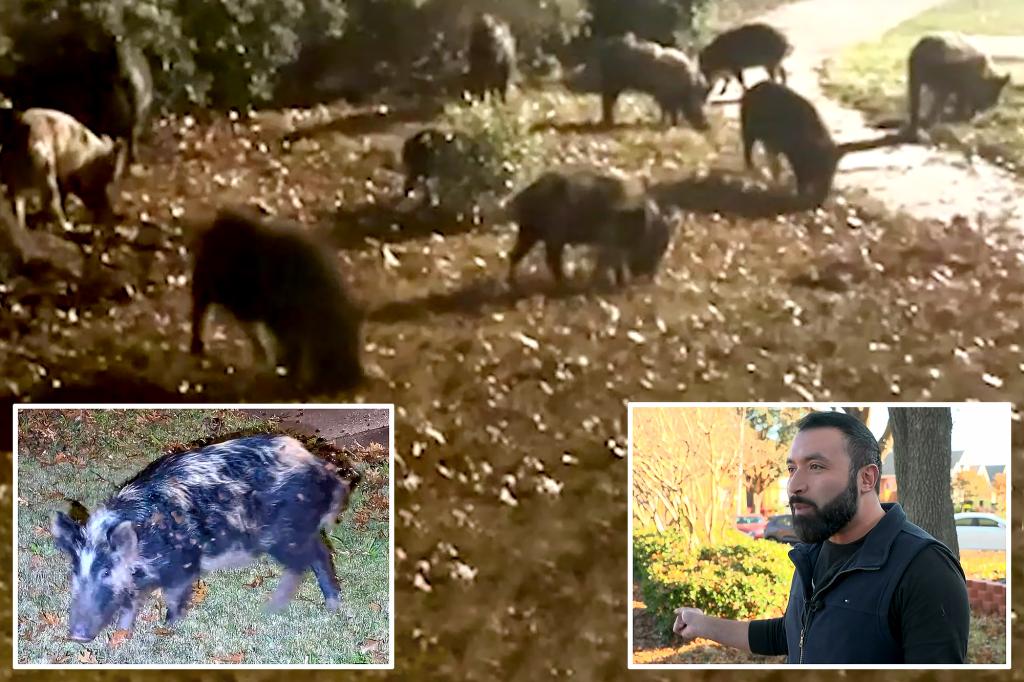The quiet suburban landscape of Irving, Texas, has been unexpectedly disrupted by an invasion of feral hogs. A sounder, estimated to contain up to ten of these invasive animals, has been wreaking havoc in residential areas, leaving homeowners frustrated and searching for solutions. The hogs’ destructive behavior, known as rooting, involves digging up lawns and gardens in search of food, often leaving behind a trail of destruction that resembles a plowed field. This behavior, coupled with their habit of rummaging through trash bags, has transformed the once-pristine yards into unsightly messes, much to the dismay of residents. The escalating problem has prompted residents to take matters into their own hands while awaiting intervention from local authorities.
One resident, Eric Mendez, recounted his experience discovering the unwelcome guests. Initially perplexed by the unexplained digging in his yard, Mendez installed a camera to uncover the culprit. The footage revealed not one, but a whole group of feral hogs, some of considerable size, using his property as their personal foraging ground. Mendez, like many other residents, grappled with the initial impulse to take drastic measures. The idea of eliminating the hogs himself crossed his mind, but the legal and safety implications of discharging a firearm in a residential neighborhood quickly deterred him. Instead, he resorted to less lethal, albeit less effective, methods of deterring the hogs, such as using a slingshot and creating loud noises by clapping pieces of wood together. This highlights the challenging situation faced by residents caught between protecting their property and adhering to the law.
The City of Irving has acknowledged the problem and engaged a contractor to address the feral hog infestation. However, the ongoing presence of the hogs underscores the difficulties in controlling these adaptable and rapidly reproducing animals. Feral hogs, or wild boars, are notorious for their prolific breeding habits. A female hog, known as a sow, can produce two litters annually, with each litter containing six to eight piglets. This rapid reproductive rate contributes to the exponential growth of their populations, making control efforts even more challenging. The hogs’ destructive behavior extends beyond mere nuisance, posing significant economic and safety concerns for both humans and their pets.
The economic impact of feral hogs is substantial, not just in Irving, Texas, but across the nation. In Texas alone, the estimated annual damage caused by these animals exceeds $400 million, according to the Texas A&M AgriLife Extension. Nationally, the figure reaches a staggering $1.4 billion, highlighting the widespread nature of the problem and the significant financial burden placed on communities and agricultural sectors. Beyond the financial burden, these animals are known to pose a direct threat to both humans and domestic animals. Their aggressive behavior, particularly when cornered or feeling threatened, can result in attacks, underscoring the potential danger they pose to residents and their pets.
A chilling example of the potential danger posed by feral hogs occurred in Houston, Texas, when a wheelchair-bound resident, Carl White, found himself confronting a pack of these aggressive animals. White, no stranger to the hogs that had been terrorizing his neighborhood and even killing pets, was forced to defend himself with an unconventional weapon – an airsoft gun. As one hog charged towards him, getting close enough for White to smell its breath, he quickly brandished the airsoft gun, using its LED light to startle the animal. The bright light proved effective, momentarily deterring the charging hog, allowing White to fire a few rounds, further ensuring its retreat. This incident vividly illustrates the vulnerability of residents, particularly those with limited mobility, to these unpredictable and potentially dangerous animals.
The ongoing struggle with feral hogs in Irving, Texas, and the broader region highlights the complex challenges associated with managing invasive species. The hogs’ rapid reproduction, destructive behavior, and potential for aggression underscore the need for effective control measures. While local authorities are working to address the issue, residents remain on edge, finding themselves in a precarious situation, caught between protecting their property and navigating the legal and safety complexities of dealing with these unwelcome invaders. The incidents in Irving and Houston serve as reminders of the potential dangers posed by these animals and the need for continued vigilance and proactive measures to minimize their impact on communities and the environment. The ongoing struggle with feral hogs illustrates the intricate balance between human activities and the natural world, highlighting the need for comprehensive strategies to address the complex challenges posed by invasive species.

